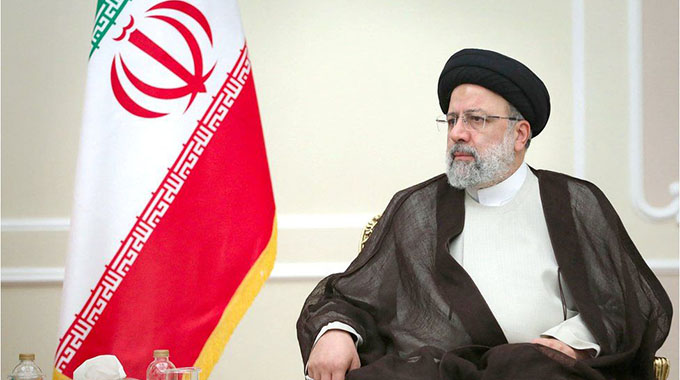Bodies from downed Ukraine plane repatriated

KIEV.- The bodies of the 11 Ukrainian citizens who died when a passenger plane was accidentally shot down by Iran this month were brought back to Ukraine yesterday in a solemn ceremony at Kiev Airport.
All 176 on board the Ukraine International Airlines flight from Tehran to Kiev were killed when the Boeing 737-800 was shot down on January 8, at a time when Iran was on high alert for a US attack.
Most of those on board were Iranians or dual nationals. Canada had 57 citizens on board. Nine of the Ukrainian citizens were crew members.
“Today at Boryspil Airport the bereaved families and the whole nation have an opportunity to pay their respects to the Ukrainian crew and passengers of #PS752 who are now home,” Foreign Minister Vadym Prystaiko wrote on Twitter.
“Deeply grateful for the messages of condolence & solidarity that we have received from around the world.”
With President Volodymyr Zelenskiy looking on, coffins draped in the Ukrainian flag were carried one-by-one from a Ukrainian military plane to waiting hearses.
Soldiers held up flags to represent the different nationalities of those who died.
Relatives came to the airport carrying bunches of flowers. Airline staff, some in tears, were waiting on the tarmac. Some knelt down as the coffins passed them.
Iran is trying to analyse the plane’s black boxes, the state IRNA news agency reported yesterday, denying a report on Saturday that a decision had been taken to send the plane’s recorders to Ukraine.
The plane disaster sparked unrest in Iran and added to international pressure on the country as it grapples with a long-running dispute with the United States over its nuclear programme and its influence in the region that briefly erupted into open conflict this month.
This comes as Qatar Airways, Emirates and several other Gulf airlines still fly in Iraqi and Iranian airspace and to cities in both countries, even as other international carriers have re-routed planes since the United States and Iran traded military strikes.
Executives and analysts said carriers in the Gulf, a major transit stop between European and Asian destinations, have few alternative routes to choose from in an area where much of the airspace is kept clear of civilian aircraft for military use.
Gulf carriers have grown into major airlines even as regional tensions in recent decades erupted into conflict. Re-routing flights hurts profits, they say, although they also insist that they take every precaution to keep passengers safe.
“Iranian airspace is important for all carriers in this region,” said Adil al-Ghaith, Emirates’ senior vice president, commercial operations, Gulf, Middle East and Iran.
Dubai-based Emirates and sister carrier flydubai together serve 10 cities in Iran and Iraq, and have continued to use the airspace of both countries for other flights.
Kuwait Airways and Abu Dhabi-based Etihad Airways have continued using Iranian and Iraqi airspace.
“We will continue to fly to Iran because Iran is an important country to us and it is our neighbour and we want to serve the people of Iran,” Qatar Airways Chief Executive Akbar al-Baker said on the sidelines of a Kuwait aviation conference.
Qatar has forged closer economic ties with Iran since 2017 when neighbouring Saudi Arabia, the United Arab Emirates and other Arab states cut relations with Doha in a diplomatic row.
The Qatari state carrier turned to Iranian airspace to keep its network that flies through its Doha hub operating.
At the same time, many other international carriers have rerouted flights to avoid Iraq and Iran since the military strikes this month, including Lufthansa (LHAG.DE), Air France (AIRF.PA), Singapore Airlines (SIAL.SI) and Qantas (QAN.AX).
Some regional carriers have also rerouted changed their routes. Bahrain’s Gulf Air has redirected European flights away from Iraqi airspace and now flies longer, more fuel consuming routes over Saudi Arabia and Egypt.
“We want to take the safest option even if it costs us a little bit more for a period of time. We can live with that,” Gulf Air Deputy Chief Executive Waleed Abdulhameed al-Alawi told Reuters.
The UAE regulator told its carriers – Emirates, Etihad, flydubai and Air Arabia AIRA.DU – this month to “evaluate flight path risks” although it said it was up to the airlines to make the final decision on the routes they chose.
“Gulf carriers face a big challenge but that doesn’t mean that risks can be taken – even if that inflicts damage on the business model,” independent aviation consultant John Strickland said.
Ukrainian International Airlines flight 752, bound for Kiev, was shot down in error after taking off from Tehran on Jan. 8, killing all 176 people aboard.
Iran said on Saturday it was sending the black boxes to Ukraine. – Reuters.







Comments